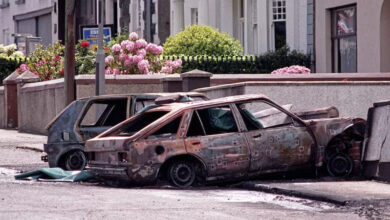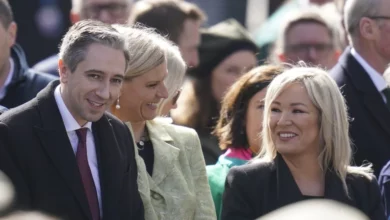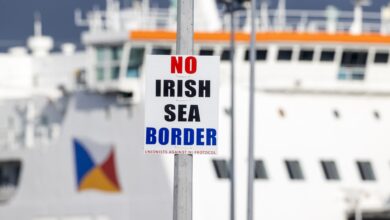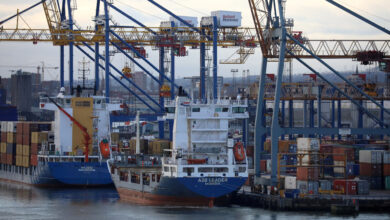éirígí, Easter Statement 2011
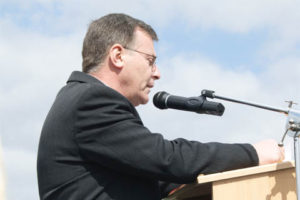 A chairde agus a chomrádaithe, go raibh maith agaibh as an cuireadh le bheith anseo libhse inniú chun omós and onóra a thabhairt do na daoine cróga uilig a fuair bás ar son saoirse na h-Éireann.
A chairde agus a chomrádaithe, go raibh maith agaibh as an cuireadh le bheith anseo libhse inniú chun omós and onóra a thabhairt do na daoine cróga uilig a fuair bás ar son saoirse na h-Éireann.
From a personal viewpoint, I’d like to say that I’m particularly honoured to stand at this memorial plot – the first name on which is that of William James Harbinson. As a child and later as a teenager, my parents would often take me and other family members to an old graveyard known as Laloo – some call it Port Mor – at the edge of Lough Neagh. We had no relatives buried there. The only reason my parents ever took us there was to visit the ‘’Fenian’’ grave – the grave of William Harbinson – a grave where the headstone was then, and still remains, smashed in two and upon which there is no mention of his name. Harbinson was the most senior Fenian in the province of Ulster when he was arrested and imprisoned in Crumlin Road gaol. It was in that gaol he died in 1867.
Belfast with its long and vibrant republican tradition, like so many other cities, towns and counties, across Ireland, has good reason to be proud of its contribution in every phase of the struggle for national liberation.
As we gather here at Easter to remember the men and women of 1916, we also pay tribute to all those who gave their lives for Irish freedom. The struggle taken up by James Connolly, Micheal Mallin, Constance Markievicz and their comrades in 1916 was the same one which the Fenian Harbinson and his comrades had participated in decades earlier.
That struggle was later carried on by Republicans of the highest calibre such as Liam Mellowes, Tomás Ashe and Joe McKelvey; by Republicans like Tom Williams, Seamus Burns, Sean McCaughey and Terence Perry in the 40s, through to more recent years when that same freedom struggle was continued by Jimmy Steele, Patricia Black, Bobby Sands, Joe McDonnell and many other courageous men and women whom we also remember today.
Each and every one of those who gave their lives in pursuit of Irish freedom had to face the personal difficulties and hardships which involvement in that struggle brought to them and their families. Each was an ordinary person faced with extraordinary choices in extraordinary times. They were ordinary people like each of us here today who saw the injustice caused to their people by capitalist exploitation and by the foreign occupation of their country and who decided to take action.
They could have ignored the injustice they saw around them and, instead, have chosen to have lived quiet lives. But their desire for freedom and justice in Ireland was such that they committed themselves fully to the Republican cause. This year also marks the thirtieth anniversary of the 1981 hunger-strike which resulted in the deaths of ten republican prisoners in the H-Blocks of Long Kesh.
The sacrifice made by those ten volunteers and their families politicised an entire generation, and demonstrated the sheer dedication, selflessness and bravery of Irish republicans.
It is right that we remember them and all those who died in the freedom struggle through commemorations such as this and that we also rededicate ourselves into that same struggle for an Irish Republic.
Easter is a time for each of us to remember those close friends and comrades who have given their lives in pursuit of our republican ideals and goals. It is a time to remember the sacrifices endured by their families. It is also a time for reflecting on the ideals which motivated them.
At Easter each year Republicans recall the words of the 1916 Proclamation – an historic document – one of the most progressive documents of its time.
The Easter Rising remains one of the defining events in the modern history of Ireland. The Proclamation of Easter 1916 remains one of the defining political documents of Irish Republicanism.
It spells out the demands for national self-determination, for social and economic justice and democracy, of cherishing all the children of the nation equally, of claiming the wealth of Ireland for the people of Ireland.
Those who came out in 1916 and in subsequent decades were men and women of principle; men and women with a vision for a new, equal and free Ireland.
The events of 1916 are quite well known – what most people are unaware of is that the legacy of 1916 led to an intense class struggle which was waged in the years between 1918 and 1923. There were 5 general strikes in southern and western Ireland between August 1918 and August 1923. Workplace occupations and land seizures began taking place and in Limerick city and other areas, workers’ soviets were declared.
Women got involved in politics on an unprecedented scale, being involved in the war and in the underground republican political apparatus.
The war for independence unleashed struggles by workers and small farmers for control of factories and the breaking up of large ranches. The revolt for Irish independence became a revolt of the exploited classes against their domestic oppressors as well.
That is a legacy of 1916 which is seldom mentioned – it is a legacy which all socialists and Republicans would do well to remember, commemorate and to emulate in coming years.
The two states on this island which were created through partition were, and still remain, hostile to the interests of Irish workers and have acted against the struggles of Irish workers time and time again.
It goes without saying what the position of Connolly and the Irish Citizen Army would have been on present day trade union leaders who fail their members day and daily in this country at a time when capitalism is in crisis and when the working class, the unemployed, the ill, the elderly and the young are under attack across the whole island.
It also goes without saying what the position of Connolly and the ICA would have been to those political parties who claim to espouse working class and republican teachings but who endorse partition and who spend their time knocking on the doors of the right-wing establishment parties seeking coalition government.
Connolly made his own position plain and unambiguous in 1910 when he concluded his pamphlet, Labour, Nationality and Religion, in the simplest and most straightforward terms: “The day has passed for patching up the capitalist system, it must go”.
In view of the events in Ireland and elsewhere of the past few years; the economic crisis caused by the greed of bankers, private landlords and property developers, culminating in the intervention by the EU and IMF in the 26 Counties; and the 4 billion pounds of cuts due to be implemented by the Stormont Coalition; it is clear that message of Connolly’s remains as true today as it was over a century ago – “The day has passed for patching up the capitalist system, it must go”.
Ireland remains divided by imperialism. The livelihoods of the vast majority of Irish people are controlled by undemocratic capitalist forces which stretch from this island to London, to Washington and Brussels. They are no different to those same undemocratic controlling forces which the Citizens Army together with the Irish Volunteers and other progressive forces mobilised against in 1916.
Those undemocratic forces, are supported, both North and South, by a pliant, subservient and self-serving political class. The extent of that subservience can be seen clearly in the manner of their meekness to the dictates of the EU/IMF. It can be seen in absence of their formal opposition to the visit by the honorary head of the British armed forces while Britain maintains its grip on the Six Counties.
That subservience can be seen in their daily collaboration with Britain. It can seen in their lack of active opposition to repressive and draconian British laws, or to Britain’s spying operations conducted by MI5, or to Britain’s deployment of its troops “in mufti” throughout the Six Counties.
Those who support and endorse the structures of partition have placed themselves firmly in the camp of the counter-revolution.
Those counter-revolutionary forces have, to quote James Connolly, “unceasingly strove to divert the public mind upon the lines of constitutional agitation for such reforms as might remove irritating and unnecessary officialism, while leaving untouched the basis of national and economic subjection.”
Make no mistake about this, comrades, over the next five years as the centenary year of the Easter Rising draws near, the forces of counter-revolution will embark upon an unprecedented revisionist propaganda campaign aimed at trying to persuade the public mind that the objectives of 1916 have been secured through the partition of our country.
We must be prepared to confront and to challenge that propaganda campaign. We must again assert, like Connolly, that “the Irish question is a social question, the whole age-long fight of the Irish people against their oppressors resolves itself, in the last analysis into a fight for the mastery of the means of life, the sources of production, in Ireland.”
We should also remember that the Irish freedom struggle has always had an international dimension. From the United Irishmen and their connections with the revolutionary Republican government in France, to the IRB and their links with the First International; from Connolly and his active internationalism, to those Republicans and socialists who joined the International Brigades and who fought and died fighting fascism in Spain. Today, as we remember our own fallen comrades, let us also remember the fallen comrades of other liberation struggles in Palestine, Latin America, and Africa.
While we are gathered here to pay tribute to fallen comrades, let me make it clear that, unlike some others, I do not pretend, or presume to know, what the thoughts or attitudes of those fallen comrades would be on the present situation, or indeed, on any of the developments which have impacted upon our struggle over the last number of years.
I can only state one fact with certainty. The objectives to which they pledged their allegiance; the objectives for which they gave their lives are the same objectives which were clearly and unmistakably enunciated through the IRB Proclamation of 1867, the 1916 Proclamation and the Democratic Programme of 1919. Comrades, those objectives have not been achieved. Settling for anything less than the complete achievement of those Republican objectives was never an option for all those whom we remember and honour today.
The business of Easter 1916 remains unfinished. Even the most cursory reading of the 1916 Proclamation reveals that the goals and objectives of those who fought, were imprisoned and who were executed are far from complete.
While today we celebrate and commemorate the 95th anniversary of the 1916 Rising, more importantly we commit ourselves to continue the struggle for a democratic, independent, and sovereign united Ireland. An Ireland whose total resources will come under the control of the ordinary working people of this island regardless of gender, religion or race – a truly free Ireland. That is our objective. To settle for anything else dishonours the vision of those we commemorate today.
Many previous generations of Republicans experienced dark and dispiriting times. They responded by re-engaging in various facets of the struggle, by re-organising and by building new networks and new alliances with other progressive and radical forces in order to try and bring about revolutionary change.
That is the task before us today, tomorrow and every day after that. The task for each of us is to help build a new Republican and revolutionary potential to drive that vision of a new Irish Republic forward and to re-awaken the inherent desire for true political, social and economic freedom and justice that exists among all people, young and old alike, in our villages, towns and cities, in our workplaces, in every one of our communities.
Comrades, as you leave here today, remember this – in the course of his oration at the grave of O’Donovan Rossa on August 1st 1915, Padraic Pearse said these words: “The Defenders of this Realm have worked well in secret and in the open. They think that they have pacified Ireland. They think that they have purchased half of us and intimidated the other half. They think that they have foreseen everything, think that they have provided against everything.”
Pearse, Connolly and their comrades later proved that the Defenders of the Realm were completely wrong in their thinking and their assessment of Republicanism. Today, a similar thinking and assessment of Republicanism pervades the mindset of the British government and of the establishment parties in both the Six and Twenty Six Counties who have accepted a two state partitionist settlement and who seek to demonise and criminalise those of us who oppose partition and the corrupt, unjust political, economic and social systems it has spawned.
As we leave here today, comrades, let us go armed with the firm intention of proving such thinking by Britain and her collaborators in Ireland to be completely wrong again.
Let us remember our patriot dead, our fallen comrades and our friends with pride, not for the sake of remembrance only, but so that their example will encourage us all to continue to struggle onwards to achieve their vision of a free, and truly independent, 32 county Irish Socialist Republic.
Beirigí bua, comrades. Ar aghaidh linn le chéile.

